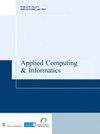Measuring digital transformation in higher education institutions – content validity instrument
IF 4.9
Q1 COMPUTER SCIENCE, INFORMATION SYSTEMS
引用次数: 3
Abstract
PurposeThis study aims to validate the content of an instrument which identifies the organizational, sociocultural and technological characteristics that foster digital transformation (DT) in higher education institutions (HEIs) through the Delphi method.Design/methodology/approachThe methodology is quantitative, non-experimental, and descriptive in scope. First, expert judges were selected; Second, Aiken's V coefficients were obtained. Nine experts were considered for the validation.FindingsThis study’s findings show that the instrument has content validity and there was strong consensus among the judges. The instrument consists of 29 questions; 13 items adjusted and 2 merged.Originality/valueA novel instrument for measuring the DT at HEIs was designed and has content validity, evidenced by Aiken's V coefficients of 0.91 with a 0.05 significance, and consensus among judges evidenced by consensus coefficient of 0.81.衡量高等教育机构数字化转型——内容效度工具
目的本研究旨在验证一项工具的内容,该工具通过德尔菲方法确定了促进高等教育机构数字化转型的组织、社会文化和技术特征。设计/方法论/方法论是定量的、非实验性的、范围描述性的。首先,选出了专家法官;其次,得到了Aiken的V系数。考虑了九名专家进行验证。研究结果本研究的结果表明,该工具具有内容有效性,并在评委中达成了强烈的共识。该文书由29个问题组成;调整了13个项目,合并了2个项目。独创性/价值设计了一种用于测量高等教育机构DT的新型仪器,该仪器具有内容有效性,Aiken的V系数为0.91,显著性为0.05,法官之间的一致性系数为0.81。
本文章由计算机程序翻译,如有差异,请以英文原文为准。
求助全文
约1分钟内获得全文
求助全文
来源期刊

Applied Computing and Informatics
Computer Science-Information Systems
CiteScore
12.20
自引率
0.00%
发文量
0
审稿时长
39 weeks
期刊介绍:
Applied Computing and Informatics aims to be timely in disseminating leading-edge knowledge to researchers, practitioners and academics whose interest is in the latest developments in applied computing and information systems concepts, strategies, practices, tools and technologies. In particular, the journal encourages research studies that have significant contributions to make to the continuous development and improvement of IT practices in the Kingdom of Saudi Arabia and other countries. By doing so, the journal attempts to bridge the gap between the academic and industrial community, and therefore, welcomes theoretically grounded, methodologically sound research studies that address various IT-related problems and innovations of an applied nature. The journal will serve as a forum for practitioners, researchers, managers and IT policy makers to share their knowledge and experience in the design, development, implementation, management and evaluation of various IT applications. Contributions may deal with, but are not limited to: • Internet and E-Commerce Architecture, Infrastructure, Models, Deployment Strategies and Methodologies. • E-Business and E-Government Adoption. • Mobile Commerce and their Applications. • Applied Telecommunication Networks. • Software Engineering Approaches, Methodologies, Techniques, and Tools. • Applied Data Mining and Warehousing. • Information Strategic Planning and Recourse Management. • Applied Wireless Computing. • Enterprise Resource Planning Systems. • IT Education. • Societal, Cultural, and Ethical Issues of IT. • Policy, Legal and Global Issues of IT. • Enterprise Database Technology.
 求助内容:
求助内容: 应助结果提醒方式:
应助结果提醒方式:


